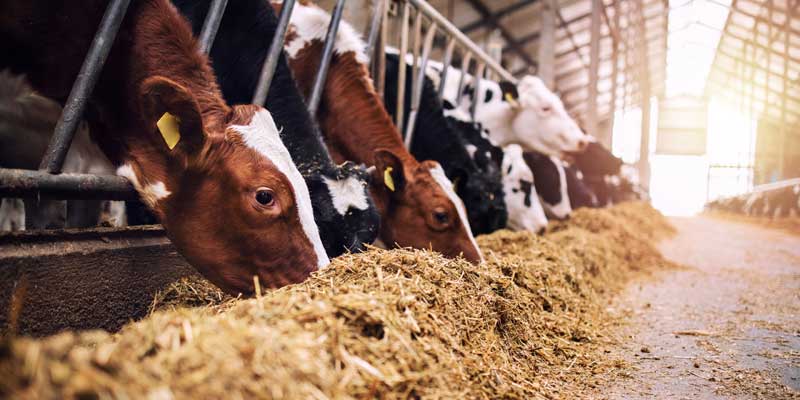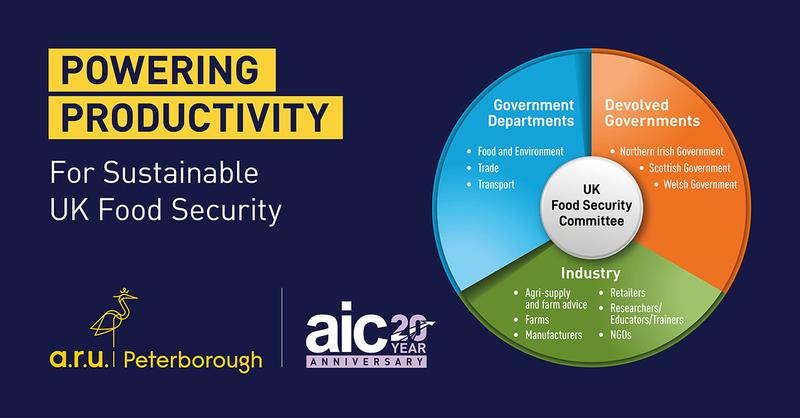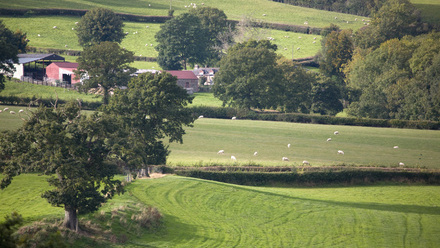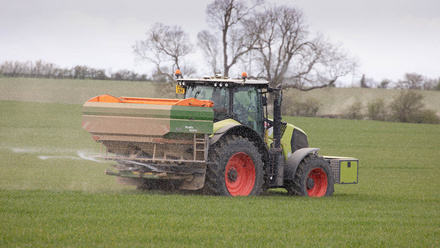AIC at 20: Commissioning an independent report on UK agri-food productivity and food security

As AIC marks 20 years as the UK agri-supply industry’s leading trade association, we're looking back at some of its greatest achievements since it was founded in 2003.
Each week throughout 2023, we’ll explore a major achievement where the Agricultural Industries Confederation (AIC) represented its Member businesses, promoted the benefits of modern commercial agriculture in the UK, and supported collaboration throughout the food chain.
In this concluding article for the AIC at 20 series, learn about the independent report that AIC commissioned to assess the UK agri-food sector's productivity levels and make recommendations on how to sustainably improve our nation's food security.
Behind the scenes
In preparation for its 20th anniversary in 2023, AIC's Board commissioned Anglia Ruskin University to independently research and produce a thorough and wide-ranging report which considered the next two decades for UK agriculture and food production.
With Peterborough being AIC's home for 20 years, it felt appropriate to commission Anglia Ruskin University as a local academic institution to partner with.
During the report tender process in late 2022, AIC was impressed by the University's new campus in Peterborough which offers a range of undergraduate courses on agriculture, food and environmental management.
Named "University of the Year" in the Times Higher Education Awards 2023, Anglia Ruskin University's recent merger with Writtle College underlines its credentials to the research and practice of agriculture in the UK.
Choosing Anglia Ruskin University's Dr Marcus Bellett-Travers to lead the research, was important for AIC that this major report was fully independent, providing a critical external challenge.
The report, "Powering Productivity for Sustainable UK Food Security", considers a multitude of key themes, including agricultural and environmental policy, divergence between the four nations of the UK, a changing population, altering diets, trade balances, and how these can combine to amplify the impacts of global trade volatility.
Watch the launch of the report at the AIC Conference below.
Report unpacked
The Powering Productivity report considers where could the UK could sustainably make agri-food productivity gains having established the yield gaps.
The core findings show that there was no single reason and the productivity landscape is extremely complicated - it would be misleading to claim a single silver bullet could solve the challenges and break down the barriers to UK productivity.
This report recognises that productivity is multifaceted and complex, with many variables that all have an impact in different parts of the UK ag sector in different ways.
Many are interdependent - for example, addressing staff availability will be acutely difficult if there are insufficient training pathways. Expanding cropping diversity will not happen if there are no markets for them, or if the chemistry is not available.
Enhancing livestock health and lowering emissions is unlikely to be achieved if the planning system does not accommodate new infrastructure or buildings.

The Powering Productivity report embraces the complexity of productivity and appreciates the number of moving parts, big and small, that are required.
Think of it like an engine consisting of many moving parts, all interrelated and reliant upon each element’s ability to perform.
In an ideal world, these parts work smoothly to deliver a productive, competitive, and sustainable agriculture running at optimal efficiency which drives the security of the nation’s food supply.

Today, the engine of UK agriculture is not firing on all cylinders, and this report seeks to assess the components that are in need of attention, diagnose some of the causes of the sector’s productivity inertia and make a series of recommendations to ensure the most efficient drive to lift productivity and competitiveness.
This is represented by the engine graphic on the report's front cover.
Committee on Food Security
This report not only approaches the nation's floundering agri-food productivity across many different sectors, but it takes it a step further by making a series of key recommendations to improve productivity while meeting environmental and net-zero targets.
Businesses, farmers and land managers throughout the food supply chain need long-term clarity and certainty which has been lacking over the past decade.
Short-term, reactive, unpredictable decision-making is not only bad for our businesses, but it also challenges our food security.

This goes beyond just political continuity. The incapability to plan, build, and invest affects our food security at a time when we need it more than ever.
To that end, the "Powering Productivity" report recommends that an independent UK Food Security Committee is created - similar to the independent Climate Change Committee.
It notes that the country would benefit from the oversight of a cross-government, cross-industry, cross-UK forum to plan for the future.
Independence is key which is why it needs to be taken outside of the scope of short-term political priorities. Instead, the UK needs independent advocates, without short-term political pressures, to be able to plan for our nation's food security and domestic production role over the long term.
As this report finds, agricultural production and the balance of imports and exports is a cross-policy issue.

The concept of an independent UK Food Security Committee is backed by AIC as the UK's agri-supply trade association, with a range of politicians, academics and industry stakeholders adding their support to this idea.
Read the Powering Productivity report's key findings to find out more, or download the report in full [PDF].
Visit the Powering Productivity report webpages to find out more or contact AIC’s Head of Policy & External Affairs Ed Barker ([email protected]).
Learn more
Watch the video below to learn about AIC's role as the UK agri-supply industry's trade association.
Make sure you're following AIC on X and LinkedIn for regular updates.
Visit the AIC at 20 webpage for more content like this.














